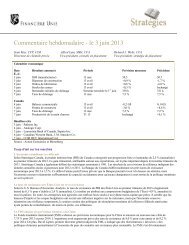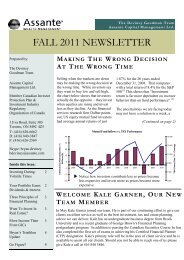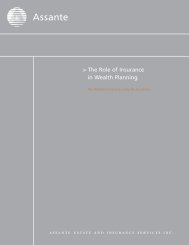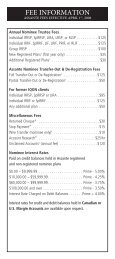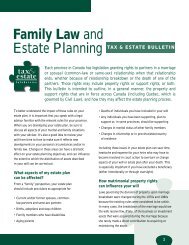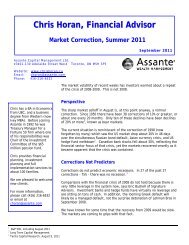Probate planning - Assante Wealth Management
Probate planning - Assante Wealth Management
Probate planning - Assante Wealth Management
Create successful ePaper yourself
Turn your PDF publications into a flip-book with our unique Google optimized e-Paper software.
specifically describes the nature and date of the will<br />
being replaced (primary or secondary). It is also<br />
critical that your wills are kept up to date because a<br />
change in assets can significantly influence your estate<br />
plan. If you are not sure whether a specific asset is<br />
probatable, it is wise to include that asset in your<br />
primary will. If you include a probatable asset in your<br />
secondary will in error, that will would require probate.<br />
In that instance, it would defeat the objective of multiple<br />
wills, namely saving probate taxes.<br />
For more information on wills, please ask for a copy<br />
of our Tax & Estate Bulletin entitled Structuring an<br />
Effective Will.<br />
EXAMPLE<br />
John Russell owned his own private company, a house valued at $250,000 (no mortgage), a bank account with a balance<br />
of $2,500 and an investment portfolio valued at $360,000. At the time of his death John’s private company shares were<br />
worth $525,000. John was a widower, with no dependents.<br />
Using Ontario rates for probate calculations, probate taxes payable would be:<br />
Single will Primary will Secondary will<br />
House $ 250,000 $ 250,000 –<br />
Bank account $ 2,500 $ 2,500 –<br />
Investments $ 360,000 $ 360,000 –<br />
Private shares $ 525,000 – $ 525,000<br />
Gross estate $ 1,137,500 $ 612,500 $ 525,000<br />
<strong>Probate</strong> calculation<br />
First $50,000 $ 250 $ 250 No probate<br />
$15 per $1,000 on balance $ 16,320 $ 8,445 No probate<br />
Total probate tax payable $ 16,570 $ 8,695 $ 0<br />
In this example, probate costs are reduced by $7,875 when multiple wills are used.<br />
NAMED BENEFICIARIES<br />
The Insurance Act allows for direct payment of<br />
the proceeds of an insurance policy on your life<br />
to a named beneficiary upon your death.<br />
Insurance designations can be made either by<br />
naming a beneficiary on the policy, or in your will.<br />
As long as there is a named beneficiary (who, in<br />
the case of an individual, is still alive at the time<br />
you die), the insurance proceeds are excluded from<br />
4



